Reptilia - Study guides, Class notes & Summaries
Looking for the best study guides, study notes and summaries about Reptilia? On this page you'll find 40 study documents about Reptilia.
Page 3 out of 40 results
Sort by
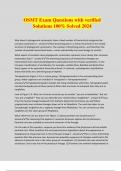
-
OSMT Exam Questions with verified Solutions 100% Solved 2024
- Exam (elaborations) • 10 pages • 2024
- Available in package deal
-
- $12.49
- + learn more
OSMT Exam Questions with verified Solutions 100% Solved 2024 Why doesn't phylogenetic systematics have a fixed number of hierarchical categories like Linnaean systematics? - answerEach branching point is a hierarchical level in the nested structure of phylogenetic systematics. The number of branching points—and therefore the number of possible hierarchical levels—varies substantially from one lineage to another. What aspect of evolution does phylogenetic systematics represent more cle...
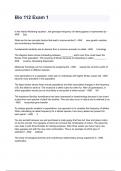
-
Bio 112 Exam 1 QUIZZES AND ANSWERS
- Exam (elaborations) • 6 pages • 2024
-
- $9.89
- + learn more
Bio 112 Exam 1 In the Hardy-Weinberg equation , the genotype frequency of heterozygotes is represented by - ANS 2pq What are the two principle factors that lead to microevolution? - ANS new genetic variation and evolutionary mechanisms Fundamental similarity due to descent from a common ancestor is called - ANS homology The diagram below shows inbreeding between _________, which over time could lower the fitness of the population. This lowering of fitness because o...
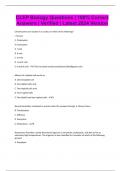
-
CLEP Biology Questions 100% Correct Answers Verified Latest 2024 Version
- Exam (elaborations) • 10 pages • 2024
-
- $7.99
- + learn more
CLEP Biology Questions | 100% Correct Answers | Verified | Latest 2024 Version Chromosomes are located in a nucleus in which of the following? I. Viruses II. Prokaryotes III. Eukaryotes A. I only B. II only C. III only D. I and II only E. II and III only - C (for test bank email ) Meiosis of a diploid cell results in: A. One tetraploid cell B. Two diploid cells only C. Two haploid cells only D. Four haploid cells E. Two diploid and two haploid cells - D Neurotransmitters contain...
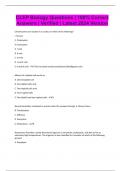
-
CLEP Biology Questions 100% Correct Answers Verified Latest 2024 Version
- Exam (elaborations) • 10 pages • 2024
-
- $7.99
- + learn more
Chromosomes are located in a nucleus in which of the following? I. Viruses II. Prokaryotes III. Eukaryotes A. I only B. II only C. III only D. I and II only E. II and III only - C (for test bank email ) Meiosis of a diploid cell results in: A. One tetraploid cell B. Two diploid cells only C. Two haploid cells only D. Four haploid cells E. Two diploid and two haploid cells - D Neurotransmitters contained in vesicles enter the synapse through: A. Binary fission B. Translocation C....
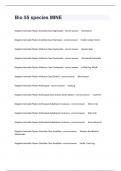
-
Bio 55 species MINE Latest Actual Exam Detailed And Correct Solutions.
- Exam (elaborations) • 4 pages • 2024
-
Available in package deal
-
- $12.99
- + learn more
Kingdom Animalia Phylum Annelida Class Oligochaeta - correct answer Earthworm Kingdom Animalia Phylum Annelida Class Polychaeta - correct answer Feather duster Worm Kingdom Animalia Phylum Mollusca Class Gastropoda - correct answer Banana Slug Kingdom Animalia Phylum Mollusca Class Gastropoda - correct answer Checkered Periwinkle Kingdom Animalia Phylum Mollusca Class Gastropoda - correct answer Frilled Dog Whelk Kingdom Animalia Phylum Mollusca Class Biva...
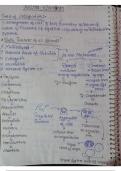
-
Comprehensive "Neet Notes On Animal Kingdom "
- Class notes • 20 pages • 2024
-
- $11.49
- + learn more
The Animal Kingdom (Kingdom Animalia) includes multicellular, eukaryotic organisms that are heterotrophic and mostly motile. It is divided into two broad categories: invertebrates (without a backbone) and vertebrates (with a backbone). Invertebrates include phyla like Porifera (sponges), Cnidaria (jellyfish), Platyhelminthes (flatworms), Nematoda (roundworms), Annelida (segmented worms), Arthropoda (insects, spiders), Mollusca (snails, octopuses), and Echinodermata (starfish). Vertebrates fall u...
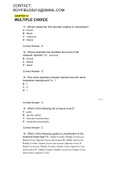
-
BIO DIV: FINAL EXAM TEST BANKS
- Exam (elaborations) • 11 pages • 2022
-
- $7.99
- + learn more
BIO DIV: FINAL EXAM TEST BANKSMULTIPLE CHOICE 11 : Whose researcher first reported variation in mosquitoes? A : French B : Dutch C : American D : British Correct Answer : ACHAPTER 19 MULTIPLE CHOICE 11 : Whose researcher first reported variation in mosquitoes? A : French B : Dutch C : American D : British Correct Answer : A 12 : Whose scientists first identified two forms of the mosquito “species”? A : American B : French C : British D : Dutch Correct Answer : D 13 : How many separate mosqui...
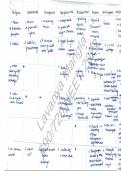
-
Animal kingdom zoology
- Class notes • 12 pages • 2024
-
- $22.99
- + learn more
The document discusses the classification of animals in the animal kingdom based on key features. It describes 11 phyla including Porifera, Cnidaria, Ctenophora, Platyhelminthes, Aschelminthes, Annelida, Arthropoda, Mollusca, Echinodermata, Hemichordata, and Chordata. Each phylum is characterized by features such as symmetry, body organization, coelom presence, and more. Chordates are further divided into classes including Cyclostomata, Chondrichthyes, Osteichthyes, Amphibia, Reptilia, Aves, and...
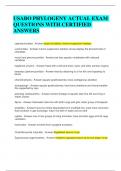
-
USABO PHYLOGENY ACTUAL EXAM QUESTIONS WITH CERTIFIED ANSWERS
- Exam (elaborations) • 3 pages • 2024
-
Available in package deal
-
- $11.49
- + learn more
USABO PHYLOGENY ACTUAL EXAM QUESTIONS WITH CERTIFIED ANSWERS cephalochordata - Answer-basal chordates; marine suspension feeders urochordata - Answer-marine suspension feeders; larvae display the derived traits of chordates myxini and petromyzontida - Answer-jaw less aquatic vertebrates with reduced vertebrae hagfishes (myxini) - Answer-head with a skill and brain, eyes, and other sensory organs lampreys (petromyzontida) - Answer-feed by attaching to a live fish and ingesting its b...
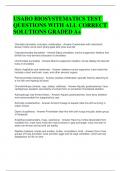
-
USABO BIOSYSTEMATICS TEST QUESTIONS WITH ALL CORRECT SOLUTIONS GRADED A+
- Exam (elaborations) • 3 pages • 2024
-
Available in package deal
-
- $11.79
- + learn more
USABO BIOSYSTEMATICS TEST QUESTIONS WITH ALL CORRECT SOLUTIONS GRADED A+ Chordata (lancelets, tunicates, vertebrates) - Answer-Coelomates with notochord; dorsal, hollow nerve cord; pharyngeal slits; post-anal tail Cephalochordata (lancelets) - Answer-Basal chordates; marine suspension feeders that exhibit four key derived characters of chordates Urochordata (tunicates) - Answer-Marine suspension feeders; larvae display the derived traits of chordates Myxini (hagfishes and relateives) -...

That summary you just bought made someone very happy. Also get paid weekly? Sell your study resources on Stuvia! Discover all about earning on Stuvia


